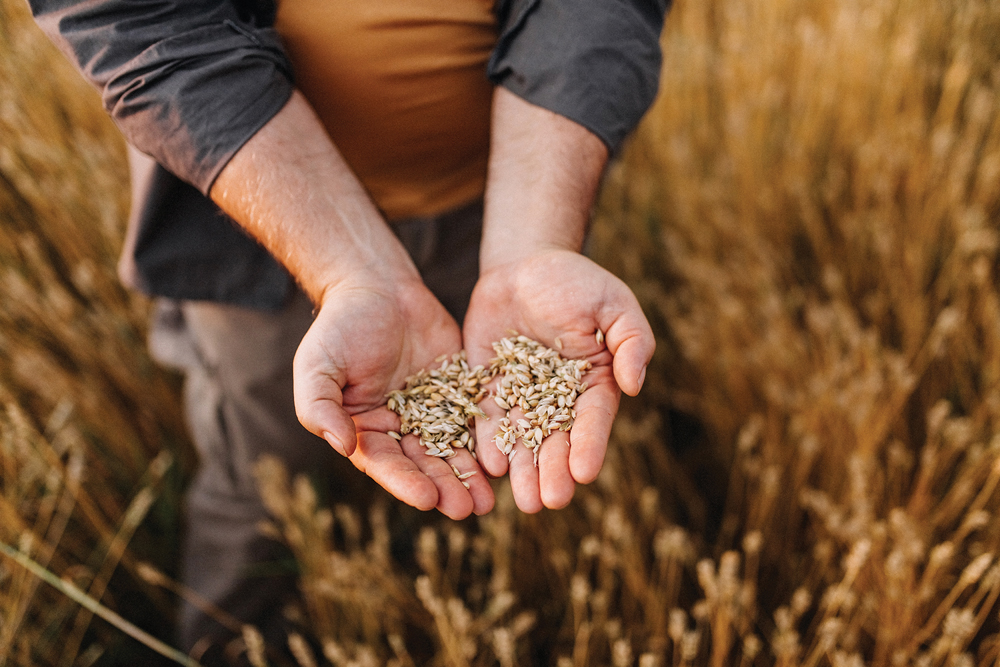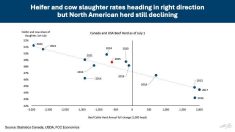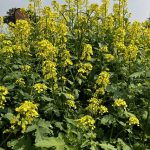Three meetings, over three weeks, and a total of nine hours later, Brett Halstead says he still doesn’t know what regulatory changes the seed industry wants.
“I still haven’t really heard what the problems are,” the Saskatchewan farmer and chair of the Saskatchewan Wheat Development Commission said during the final online Seed Summit meeting Feb. 23, organized by Seeds Canada and its partners to discuss the Seed Regulatory Modernization (SRM) process. That’s underway in collaboration with the Canadian Food Inspection Agency (CFIA), the seed sector and farmers.
Read Also

VIDEO: Manitoba’s Past Lane – Jan. 31
Manitoba, 1946 — Post-war rations for both people and cows: The latest look back at over a century of the Manitoba Co-operator
“I just hear it’s ‘issues,’ but if I don’t hear what they are then I don’t know why we have gone through this process… ”
Weeks later Halstead still hadn’t heard.
“I still feel the same way about the seed summit… and this has been emphasized by others I’ve talked to… ” he wrote in an email April 12. “Nearly everyone has said it was a waste of time.”
Why it matters: The Seeds Act’s regulations are under review, and some in the seed industry contend fewer regulations will result in better outcomes, and that market forces will ensure quality seed for growers.
Shawna Mathieson, executive director of the Prairie Oat Growers Association, said in a March 9 interview she found the meetings, held online Feb. 7, 14 and 23, confusing. She’s unsure of their purpose and therefore questions if anything was accomplished.
If farmers see value in a variety, they will buy it, and the company that produced it earns a return.
“So I guess I don’t understand why there’s even this discussion,” Mathieson told Alanna Koch, the Seed Summit keynote speaker Feb. 7.
“All I can tell you as a farmer I know that we’re just not seeing those options available to us,” Koch said. “I know we’re not seeing the variety improvements that we should be. We’re seeing investment fleeing Canada.”
Syngenta shelved its Canadian wheat-breeding program in 2019 in a move widely believed to have occurred because Canada’s seed system wasn’t providing enough returns to the company.
CFIA, which began the SRM process in 2020, says it’s a “once-in-a-generation” opportunity to make holistic changes to Canada’s seed regulations.
Some say the registration system ensures farmers get improved varieties and prevents seed growers from multiplying seed unlikely to be popular, saving them money.
It’s also flexible with the crop value chain determining what level of merit testing is necessary ahead of registration.
“It’s the value chain not the government that decides where the crop should be,” Three Hills, Alta., seed grower Sarah Weigum told the Feb. 14 meeting.
Others say farmers will be better served through deregulation allowing market forces to work.
Goals for regulatory reform include improved system consistency, reducing complexity and strengthening consumer protection for farmers and crop users, Wendy Jahn, national manager of CFIA’s Seeds Section, said in an interview Oct. 5, 2021.
While there’s some common ground on the need for more flexibility, efficiency, transparency and digitization, there are differing views on how to achieve it, on the role of government and where the Canadian Seed Growers Association (CSGA) and Seeds Canada fit in.
Although CFIA administers the Seeds Act, CSGA — which represents Canadian seed growers, who are mostly farmers — has the regulatory authority for seed crop certification and varietal purity standards for all crop kinds except potatoes. It’s also responsible for certifying breeder and select seed.
Seeds Canada, formed in early 2021 with the merger of Canadian Seed Trade Association, the Canadian Seed Institute, the Commercial Seed Analysts Association of Canada and the Canadian Plant Technology Agency, wants others to be able to certify seed crops claiming competition will reduce costs.
It also says the cost of certification can be reduced by eliminating duplication and allowing seed growers to do their own crop inspection. Lower certified seed prices will narrow the price gap with farm-saved seed. The more certified seed farmers buy, the more royalties are collected plant breeders can reinvest in new varieties, Nick Sekulic, an Alberta seed grower and Feb. 14 meeting panellist said.
“Be cautious about deregulation, it often means re-regulation to someone else’s advantage,” Wayne Amos, an Oxbow, Sask., seed grower, wrote in the chat box during the Feb. 14 meeting.
Seeds Canada seems to want to self-regulate, Amos said in an interview later. But third-party seed crop inspection ensures system integrity, he said.
Before the merger there was consensus on a single ‘window’ for seed services. But after CSGA members voted strongly against merging, Seeds Canada’s position changed, confirming for some seed growers their wariness.
Even though the federal government is open to substantial changes it will be informed by the seed industry and farmers first, Jahn said.
A working group, representing the seed sector and farmers, along with task teams, was formed to try and reach consensus on seed regulation changes.
Seeds Canada said its meetings were designed to bring more awareness to the issue. And while the meetings promoted Seeds Canada’s position, opponents were heard. There were calls to build trust and collaboration within the seed industry so everyone is better off.
Seeds Canada speakers repeated the status quo isn’t an option, even though it seemed most participants agreed some regulatory improvements can be made.
Speakers also claimed that since the Seeds Act’s regulations have not had a major review since 1996, they are out of date.
“For clarification, the seed regulations have been changed many times in the last 25 years, to address specific needs and changes,” Jahn wrote in the Feb. 7 meeting chat box. “What is unique about this opportunity is the chance to look at the regulations in their entirety, to take a holistic look at the seed regulatory framework.”
Halstead wasn’t alone in seeking specifics. Minutes earlier Weigum asked entrepreneurial plant breeder and Saskatchewan farmer Jodi Souter what needs changing.
Souter said it depended on the crop, adding Canadian pulse breeders say their varieties are released in the United States two to three years sooner than in Canada.
“I can think of quite a few examples with quite a few breeders that have products that would be very helpful but the hurdles, the barriers are keeping them on the shelf,” Souter replied.
Breeders want to use modern breeding tools, an allusion to regulations on plants with novel traits that trigger more government scrutiny, but that’s outside the scope of the current discussion.
Delays in getting new varieties was a constant theme, yet a current and retired plant breeder disputed it.
“For crops that do not require merit testing there is no difference in time to market varieties between U.S. and Canada,” Bryan Harvey, emeritus professor at the University of Saskatchewan wrote in the chat box. “For crops like wheat and malting barley there is very little difference because in the U.S. there is a very parallel pre-release testing system.”
Lethbridge-based AAFC winter wheat breeder Rob Graf made a similar point.
“Timelines to commercial introduction of wheat in the U.S. are similar to that in Canada… ” he wrote in a later email, citing publicly available information from the U.S. registration organizations and the Crop Science Society of America.
Corn and food-grade soybeans are not subject to registration in Canada, a CFIA official wrote in the meeting chat box, implying registration isn’t a roadblock for those crops. While oilseed soybeans fall under Part III of the tiered process, they can be registered in eight weeks or less.
Similar message
The rhetoric was similar with various speakers, including Seeds Canada executive director Barry Senft, saying regulations are barriers to seed company competition and plant-breeding innovation and make Canadian farmers less competitive.
One private seed company representative made the case for less regulation, but declined this reporter’s request to include their comments here.
While Seeds Canada allowed reporters to attend the meetings and report on what invited speakers said, it decreed reporters seek permission before reporting what participants said so they could speak frankly.
Despite several requests speakers failed to say exactly what changes are needed.
“It’s not something that’s easy to answer, and I am sorry that I am not solving it with a silver bullet here… ” Souter said.
If Seeds Canada has come to a consensus on registration, it’s not articulating that consensus.
Ways for seed developers to collect more royalties for additional plant breeding was often alluded to, but ‘value capture’ is not part of the SRM process either.
And with farmers funding AAFC and university variety development it gets even more thorny. If farmers face more royalties, they might request their cereal checkoffs back, hurting cereal commission operations and public breeding programs.
Presumably, more farmers realize if they are going to have to pay for variety development doing so through commissions gives them greater control.
“I think the challenge has been that we haven’t seen the investment occur in all crops the way we need to,” Koch said during the Feb. 7 meeting. “Certainly we haven’t seen as much progress in wheat that I had imagined we would.”
Some farmers disagreed.
In Manitoba yield advances in canola have lagged wheat substantially,” one farmer wrote in the chat box.
“Publicly accessible data from MASC (Manitoba Agricutural Services Corporation) shows advances in wheat yield gains have made greater strides than canola.”
MASC data shows the five-year average insured Manitoba canola yield between 2016 to 2020 was 43.4 bushels an acre, up 68 per cent compared to the average between 1993 and 1997.
Insured red spring wheat yields averaged 59.5 bushels an acre, up 94 per cent from the 1993-97 average.
“Interesting note is that canola is all private breeding and wheat genetic gains (funded mainly by the public and farmers through AAFC) have been greater than canola,” Halstead said in an email. “So something is working well in wheat breeding.”
While Seeds Canada promotes more plant-breeding competition one suspects private seed companies would prefer less competition from AAFC. In 2021 just one AAFC spring wheat, ACC Brandon, accounted for half of Manitoba’s red spring wheat acres.
“I don’t know enough about the whole seed industry, but (I) see this as being driven by the desire to expand private investment in seeds beyond canola, but with the private investment there appears to be a desire to implement intellectual property protection and the ability to apply royalties and end the farmer right to save and use farm seed,” Vansoy, Sask., farmer Glenn Wright, wrote in the chat box. “Throughout this process, it has never been made clear how farmers will benefit.”
One seed grower wrote regulatory change “may lean towards the ‘canola model’ and I mean that in a negative way, as most farmers are of the belief that this canola model isn’t preferred. High cost of seed, limited choice of seed suppliers, controlled input pricing… and on and on.”
But Sekulic, who grows and sells seed in the Peace River area, argued large canola acres are proof the canola model works.
“I think we need to start thinking about adopting that same kind of thinking for all the other major crops that grow up in our part of the world and on dry land,” he said.
But farmers like Wright say canola seed prices are too high with a markup of 50 to 70 times the price of canola at the elevator, he wrote in an email.
“When canola was $10 a bushel, we paid between $500 to $700 per bag of seed (one bushel),” he wrote. “(For) cereal crops, the markup on seed is only two or three times (the value of the crop). I sell the commodity for $5 per bushel and often can buy new seed stock at $12 per bushel.”
As the final meeting concluded Mathieson said the industry needs a list of problems, why they need fixing and the cost.
“We frankly have gone around this issue for years and we still have no concrete answers about what the problems are and how this would address it or how it’s actually going to benefit producers long term,” she said.
More than 700 people registered for the meetings and as many as 300 were signed in at times.

















